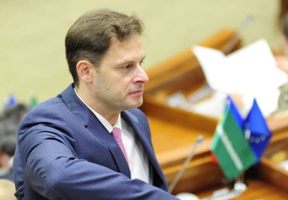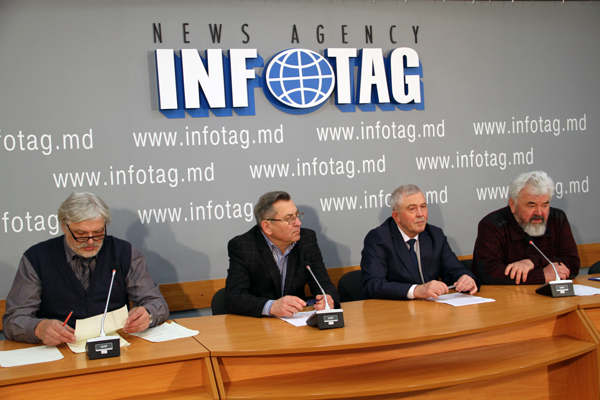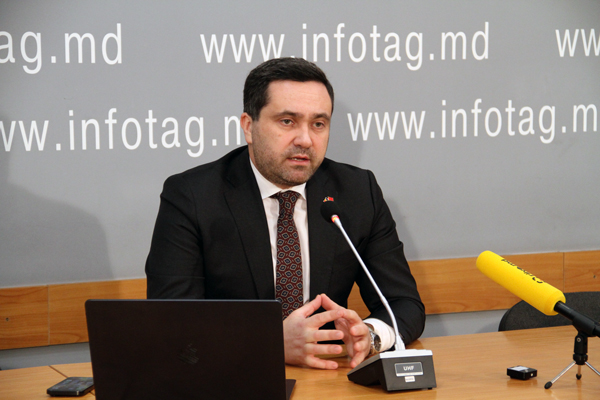Interview
MP LUCINSCHI COMMENTS ON GOVERNMENT’S ABILITY TO RUN MOLDOVA

The perception of the draft law on state budget 2016, which appeared in late April, is completely ambiguous – starting from small commentaries and additions to complete disapproval and desire to make everything in a completely different way. The Infotag is publishing the opinion of parliament deputy, member of the parliamentary Standing Committee on Economy, Budget and Finance Chiril Lucinschi, expressed by him in a interview to correspondent Vladimir Sidorenco.
Part 1. Delay in adopting budget 2016 is worthy to be included in Moldovan Guinness Book.
Q: Mr. Lucinschi, in summer 2015, less than a year ago, the Moldovan Parliament introduced an amendment to the Article 7 of the Tax Code, which implies to bring into force the new rates, adopted for fiscal policy execution, only 6 months after their publication in the Monitorul Oficial governmental bulletin. The amendment is reasonable as tax innovations should not take economic agents by surprise as the entrepreneurial activity implies the signing of long-term contracts both at purchasing and at selling goods at the previously agreed prices. However, the draft budget 2016 somehow proposes to introduce changes in other laws, to derogate the earlier adopted provision. Why the norms of the current tax legislation are being infringed?
A: The using of the phrase “prin derogare” [by means of derogation] in the Moldovan legislation is not an innovation. Maybe it sounds unusual in the context of Tax Code, but the Parliament systematically introduces it in the Customs Code. For example, at exempting special cars, imported for local authorities’ needs and for charity organizations, from payment of VAT on import and customs duties.
However, I cannot answer to the question why Finance Ministry officials do not take into account the Tax Code provisions at making up the 2016 budget. I can only suppose that if, for example, the state budget is adopted on June 1, while published in Monitorul Oficial on June 11, the new tax rates will enter into force only in mid-December 2016.
It turns out that there is no sense to vote for the fiscal policy and the state budget for 2016.Perhaps, the Finance Ministry proposed this formulation in order that the proposed tax parameters to enter into force at least in the middle of 2016. It is good that the Ministry does not suppose that new tax rates should be introduced starting from January 1, 2016!
You know, the protraction of budget 2016 adoption is worthy to be included in the Moldovan Guinness Book. Though, all this was predictable back in autumn 2015, when the Democratic Party agreed to dismiss Valeriu Strelet Government. Had that resignation not happened, the budget 2016 would have been adopted in December 2015, as the first stage of negotiations with the International Monetary Fund (IMF) was already conducted and the main parameters of external financial assistance were identified. In late 2015 it was expected the arrival of IMF mission for signing the final document.
After the Government’s resignation, DP Chairman Marian Lupu loudly announced in the Parliament that the new pro-European Government will be appointed in the nearest time. Thus, problems with signing IMF program should not occur. However, the attempt of blitzkrieg failed. First of all, the Government was appointed only in late January 2016. Secondly, European donors and American partners keep blocking any international financial assistance to Moldova, as they do not believe that this cabinet of ministers is able to conduct reforms, which are a condition for getting financing.
It is for the first time when I witness that Europeans refuse to financially support the pro-European Government of Moldova. Nobody knows what will happen tomorrow. The society is being fed with official statements about productive cooperation between the Government and the IMF. Fact-finding mission of the Fund has already twice visited Chisinau, though without mandate to sign program or memorandum. In the coming four-six weeks something positive can hardly happen.
Q: How can Moldova work and live without a fiscal policy and a budget for 2016?
A: In my opinion, if these two documents are not adopted in the nearest time, a reasonable question will appear: is the current Government able to run the country? Thus, the derogation, proposed by the Finance Ministry, are just trifles against the existing background.
Part 2. Fiscal policy agitates business every year
Q: Do you think that the LDPM, while in power, was running the country more productively?
A: I think yes. There are a lot of positive examples to this. In any case, back then the overwhelming number of primarias [local government authorities] had much more financial opportunities than they have today.
Q: For what period of time will this departure from the law, proposed in the draft budget 2016, be valid?
A: As long as the law is valid.
Q: But financiers and lawyers would disagree with you. Given the text of the proposed amendment, they suppose that its enactment through an ordinary law on amending legislative acts, without making changes to the Tax Code, is nonsense.
A: Whether it is acceptable to use this notion in the context of customs legislation?
Q: Why then Parliament deputies allow the Tax Code pulling apart?
A: I think this is due to a bad organization of the bills preparation process.
Q: The adoption of the amendment by means of derogation is comparable with changing of game rules in the run-up to the game. How can entrepreneurs conduct their business in such unpredictable legislative conditions?
A: I agree that it is difficult. The generally accepted international rules of doing business imply stability of the state tax policy. In particular, the entrepreneurs from Wales (Great Britain) are more or less informed about budget parameters and tax rates until 2023. Thus, they can easily plan investment projects, which will bring them a predictable sum of revenues.
Moldova’s problem is not the question whether the tax rates will or will not be raised. The problem is that we are disturbing the business society each year. Business people can plan nothing as the Government may wake up tomorrow and announce that excise tax rates will be different.
The strangeness is that the Government, according to the legislative provisions, is conducting budgetary mid-term planning – for three years, while the Parliament adopts the state budget annually. But what is the most astonishing is that the Moldovan business has long got used to live in conditions of complete chaos. Entrepreneurs are ready for everything. Some of them even have bags packed to leave the country at any moment.
Q: Why?
A: Because it is impossible to do business here. Only major businesses remained, with which small and medium enterprises are not able to compete. However, even large entrepreneurs did not register growth of revenues. The population purchasing capacity is low. The state of things at legal entities is not much better. Recently, a tender was announced on conducting construction and assembling works worth 1.5 million lei, in which 18 large building companies participated.
Q: In June, only the draft budget 2016 is being discussed, when it is already the time to consider the fiscal policy 2017.
A: I will cite Mr. Finance Minister Octavian Armasu, who said that the deadline for consideration of fiscal policy 2017 by the Parliament is the beginning of July.
Q: Then when the 2016 policy will be approved?
A: Approximately in the same time frames as the draft state budget 2016, which is directly connected with signing of cooperation program with the International Monetary Fund.
Q: Thank you for your time, Mr. Lucinschi.
























Add Comment